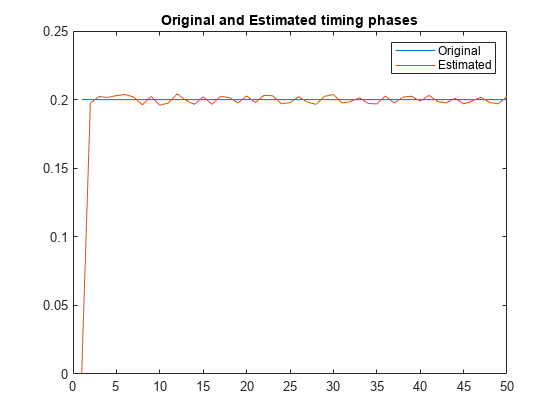comm.MSKTimingSynchronizer
Recover symbol timing phase using fourth-order nonlinearity method
Description
The comm.MSKTimingSynchronizer
System object™ recovers the symbol timing phase of a minimum shift keying (MSK) modulated
signal using a fourth-order nonlinearity method. This object implements a general
non-data-aided feedback method that is independent of carrier phase recovery but requires
precompensation for the carrier frequency offset.
To recover the symbol timing phase of an MSK modulated signal:
Create the
comm.MSKTimingSynchronizerobject and set its properties.Call the object with arguments, as if it were a function.
To learn more about how System objects work, see What Are System Objects?
Creation
Syntax
Description
mskTimingSync = comm.MSKTimingSynchronizermskTimingSync.
This object recovers the symbol timing phase of an MSK modulated signal using a
fourth-order nonlinearity method.
mskTimingSync = comm.MSKTimingSynchronizer(Name=Value)comm.MSKTimingSynchronizer(ErrorUpdateGain=0.045) sets the error
update step size to 0.045.
Properties
Usage
Description
[
restarts the timing phase recovery process when you input a nonzero reset signal, R. To
enable this syntax, set the Y,phase] = mskTimingSync(X,R)ResetInputPort
property to true.
Input Arguments
Output Arguments
Object Functions
To use an object function, specify the
System object as the first input argument. For
example, to release system resources of a System object named obj, use
this syntax:
release(obj)
Examples
Algorithms
The timing extraction algorithm consists of these steps:
Pass the sampled baseband signal through a fourth-order nonlinearity to extract timing information.
Differentiate the signal digitally following the nonlinearity.
Smooth the output of the digital differentiator to yield an error signal.
Use the error signal to adjust the sampling of the baseband signal.
More specifically, the algorithm employs a timing error detector that outputs a timing error value, e(k), for the kth symbol, as defined in as defined in Synchronization Techniques for Digital Receivers by Mengali, Umberto and Aldo N. D’Andrea (New York: Plenum Press, 1997) by this expression.
where
r is the input signal
T is the symbol period
Ts is the sampling period
* means complex conjugate
dk is the phase estimate for the kth symbol
D is 1 for MSK and 2 for Gaussian MSK modulation
References
[1] Mengali, Umberto and Aldo N. D’Andrea. Synchronization Techniques for Digital Receivers. New York: Plenum Press, 1997.
Extended Capabilities
Version History
Introduced in R2012a
